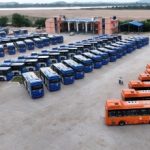New Delhi: China’s Wuhuan Engineering Company has bagged the Lump Sum Term Key contract for the Talcher Fertisers Plant in Odisha. The government of India is reviving the Talcer Plant which was closed for long as the technology became unviable.
The contract to the Chinese company was awarded in the presence of union chemicals & fertilisers minister DV Sadananda Gowda and union petroleum minister Dharmedra Pradhan at a ceremony, here on Tuesday.
Following a rigorous tendering process, the government has selected Wuhuan Engineering Co. Ltd., China LSTK contractor for implementing the coal gasification and ammonia/urea packages of Talcher Fertilizers Ltd. . Wuhuan has rich EPC experience in coal gasification plants.

As part of revival of closed fertiliser units of Fertiliser Corporation of India Ltd.(FCIL) policy, the government has mandated TFL, a joint venture company of nominated PSUs such as RCF, CIL, FCIL and GAIL, to revive the Talcher unit of FCIL.
With an estimated investment of Rs. 13,277 cr. the project shall produce 1.27 MMTPA of Neem coated Urea through gasification of a mixed feedstock comprising of high ash Indian coal and petcoke. TFL has been allotted northern part of North Arkhapal mine as captive mine for meeting its coal requirements and petcoke shall be sourced from Paradip refinery of IOCL. The commissioning of this project is expected in third quarter of 2023.
The ‘Inauguration of Works’ of the project has already been done by prime minister Narendra Modi in September 2018 and since then TFL is executing many of the pre project activities at site which are essential before actual project work commences. Activities like site development, provision of construction water and power, guest house etc. are currently underway at the Talcher site and shall be completed soon. Further tendering process for other major packages is also underway and it is expected that majority of the tenders shall be awarded before end of this Financial Year.
This project shall improve India’s self-sufficiency in Urea and promote agriculture growth thereby reducing the import of urea in the country which shall in turn is expected to have a significant effect on the LNG imports besides providing employment opportunities to the local populace and also flipping the ancillary industries in the region.





